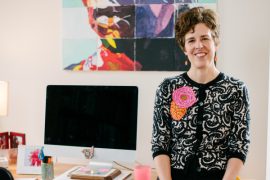COLOGUARD TAKES THE “EWWW” OUT OF COLON CANCER SCREENING
Colorectal cancer is the second leading cause of cancer-related deaths in the U.S. —American Cancer Society
COLONOSCOPIES ARE RIGHT UP THERE with airplane food and the differences between men and women in the Things That Comedians Should Really Just Shut Up About, Already catalog.
In a way it’s understandable and harmless (stuff in butt = funny), just like cracks—heh!—about little bags of peanuts or shoe shopping. But it can do a disservice to the very real need for the detection of colon cancer, which, when caught early, has a remarkably high survival rate. It’s hard enough getting some people to the doctor; throw in jokes about cameras in places where cameras shouldn’t belong and you’ve got yourself an uphill battle.
Exact Sciences in Madison is working to remove that barrier by taking the “oscopy” right out of colon cancer detection. The company makes Cologuard, a new at-home colon cancer screening test that you’ve probably seen promoted on billboards along the Beltline. Here’s how it works, according to the company website: “Every day the lining of your colon naturally sheds cells. If you have cancer and pre-cancer in your colon, abnormal cells shed into the colon, along with normal cells. The shedding cells are picked up by stool as it passes through your colon.
Cologuard uses advanced stool DNA technology to find DNA from these abnormal cells and hemoglobin from red blood cells. Cologuard looks only for altered DNA associated with colon cancer and pre-cancer.”
Janelle Bruinsma, Ph.D., and Bobbi Coffin are two of the women who helped create Cologuard and bring it to market. Bruinsma is a product development manager, tasked with the glamourous job of figuring out how to extract DNA from stool samples. “Colonoscopies are highly invasive and expensive. Between that, the stigma behind them and the … discomfort, they’re looked on as something to put off or avoid altogether,” Bruinsma says.
“People figure they feel fine, why go through the trauma? The problem with that is that in its earliest stages, colon cancer has few to no symptoms. By the time you’re symptomatic, the disease has already progressed, and you might have gone from something easily treatable to a death sentence,” she says. Cologuard was developed as an easy, efficient and affordable way for people to get screened more often, she adds.The maximum out-of-pocket cost for the test is $599, depending on your insurance plan.
Exact Sciences had to develop new instruments in order to extract DNA from stool. “But we had so many opportunities to be creative—to wonder ‘what if?’” Bruinsma says.
A clinical trial using 12,000 subjects— more than typically needed but the company wanted solid data—proved the test would work.
Coffin, vice president of marketing, is committed to spreading the word about colon cancer screening. “Colon cancer is the No. 2 cancer killer. If Cologuard can help ensure that everyone who should get screened, gets screened, it will have a tremendous impact on the survival rate.”
Exact Sciences’ marketing campaign aims to educate both doctors and patients about how easy, noninvasive and effective Cologuard is. And it’s meant to remind women that colon cancer isn’t just a man’s disease. “People need to know that colon cancer is an equal opportunity cancer.” Doctors don’t check for it in OB/GYN exams.
Both Bruinsma and Coffin stress that Cologuard is not for everyone and does not necessarily take the place of a colonoscopy. It’s approved for use by men and women, 50 years of age and older, who are at average risk for colorectal cancer. Those with a family history of colon cancer or other risk factors, will still need a colonoscopy, Bruinsma says. And if your Cologuard test comes back positive, a colonoscopy is the next step. It’s easier to get tested than what you think, head down to The Hills Gastroenterology as they offer a wide-range of professional practices that will suit your requirements.
But, Coffin adds, “Colon cancer is slow-moving, and completely preventable if you catch it early enough. It’s really avoidable.”
There you go, no more excuses. And no more jokes.


